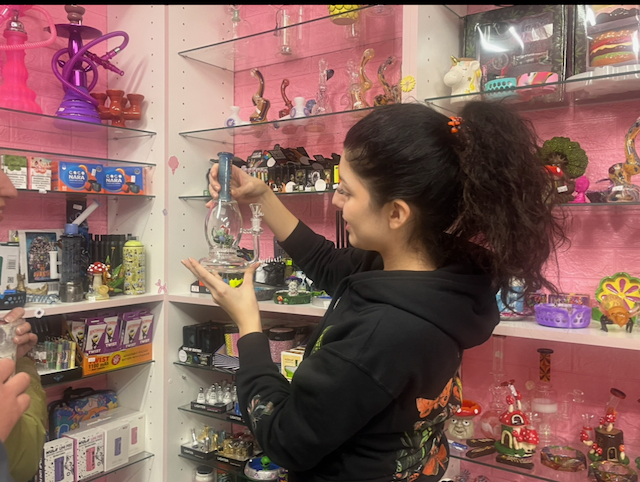Champaign smoke shop likely violating anti-discrimination laws, expert says

Hailey Alessandra, the owner of Hailey’s smoke shop in Champaign, shows customers a bong on Feb. 27. Alessandra said she wants her store to be a safe space for women, but a legal scholar said hiring only women could violate anti-discrimination laws. Nour Longi
A new Champaign smoke shop could violate state and federal anti-discrimination laws by hiring only female staff members, according to legal experts.
The smoke shop, called Hailey’s, celebrated its grand opening on Sixth Street last month. The bubble gum pink store offers an array of bongs, pipes and other smoking accessories in shades of pink and purple.
The owner, a senior at the University of Illinois named Hailey Alessandra, said the shop offers a shopping experience catered towards women and their comfort. This is why, she said, she only wants to hire female staff members.
“What makes it different from other places is that I only have girl workers,” Alessendra said. “I'm just really trying to think about ways to make it a more comfortable place, like not having men workers.
“Men are welcome, of course, but having a female worker makes it easier, more comfortable to go to the store and not have anxiety knowing that you're not gonna get sexually harassed or judged.”
But according to anti-discrimination laws, it’s illegal to hire only one gender.
These laws exist on the state and federal level, and they prohibit employers from using characteristics like race, religion or gender in their decision to hire someone.
In Illinois, Section 17 prevents employers from discriminating against employees on the basis of sex, race or religion.
However, according to the Illinois Department of Human Rights, there are a narrow set of exemptions that employers can use to justify sex-based hiring.
The department determines this on a case by case basis, according to its website.
This means there is no blanket set of rules that allow certain employers to break anti-discrimination laws — only an investigation can determine if a business qualifies.
One of these exceptions are Bona Fide Occupational Qualifications, according to Cornell Law School.
This designation allows employers to legally refuse to hire a person based on their sex, religion or national origin if hiring a specific demographic is both necessary for the business to function properly and integral to the tasks and functions of the job itself, according to Cornell.
Alessendra said she can only hire women because it is integral to the purpose of her business — making women feel comfortable — and therefore qualifies for an exception under the law in the same way she said Hooters was granted the right to hire only female servers.
Although Hailey’s has not received any male applicants, she said there are certain jobs in her shop that she would only hire women to do.
“The point is I want it to be a safe space for girls,” Alessendra said. “I don't want to have guys working there.
“Of course, if I'm sick, then obviously my fiance would work there, and that's like, probably the only exception where a guy would be working behind the register … that’s really a last resort option.”
Alessendra said she didn't research the legality behind only hiring women, but she said Hailey’s does not violate any anti-discrimination laws.
However, Northwestern Pritzker School of Law professor and anti-discrimination law expert Kimberly Yuracko said businesses like Hailey’s typically wouldn’t qualify for an exception under the category of bona fide occupational qualifications.
In practice, there have been two types of cases in which courts determined that gender could be used as an occupational qualification for the purpose of restricting hiring, businesses, Yuracko said.
She said the first type is when sex-based hiring is needed to protect the privacy or safety of the customers. For example, courts have allowed sex-based hiring in OBGYN units.
The second type, Yuracko said, is when sex-based hiring is needed to offer some type of heteronormative sexual titillation. This has been the justification for sex businesses to engage in sex-based hiring to maintain the essence of their business.
Hailey’s would not fall into either of these categories, Yuracko said.
“There's not a privacy protection for women, the privacy protection that we've seen is really about bodily privacy,” she said.
“It's not about like comfort, about like, general comfort, it's really been about sort of shielding one's body from the duties of the other sex and putting that out. Nor is this a sexual titillation case.”
Based on precedent, if a situation like Hailey’s went to court, Yuracko said she doesn’t think the court would rule in favor of the smoke shop.
“To me, the justification sounds a lot like the kind of gender stereotyping about what's going to make women feel most comfortable that courts have not been very sympathetic to,” Yuracko said.
“And they're also typically not so sympathetic to the argument that a business needs to engage in sex discrimination in order to prevent harassment, except for a few cases.”
As of March 8, there is no official legal investigation or claim that Hailey’s is engaging discriminatory practices.
For an investigation to begin, there would have to be a complaint filed against Hailey’s to the Illinois Department of Human Rights to determine if the business is not in compliance with anti-discrimination laws.

